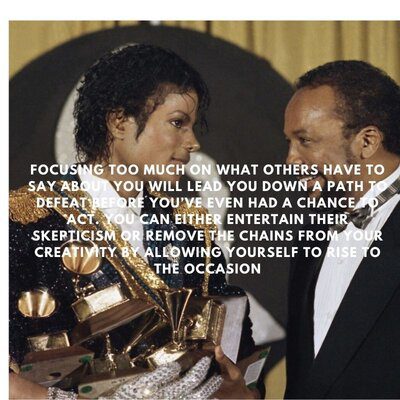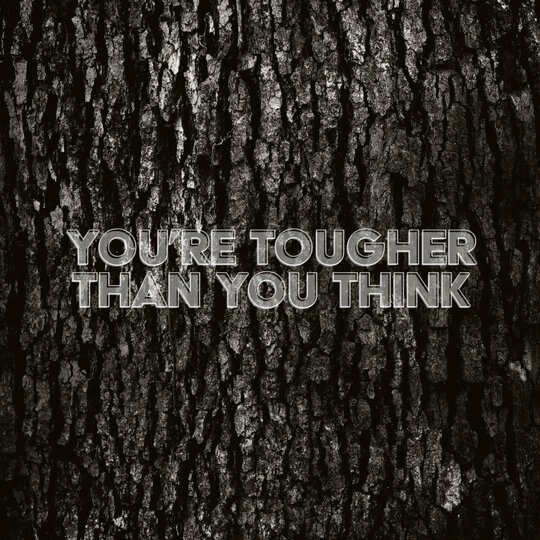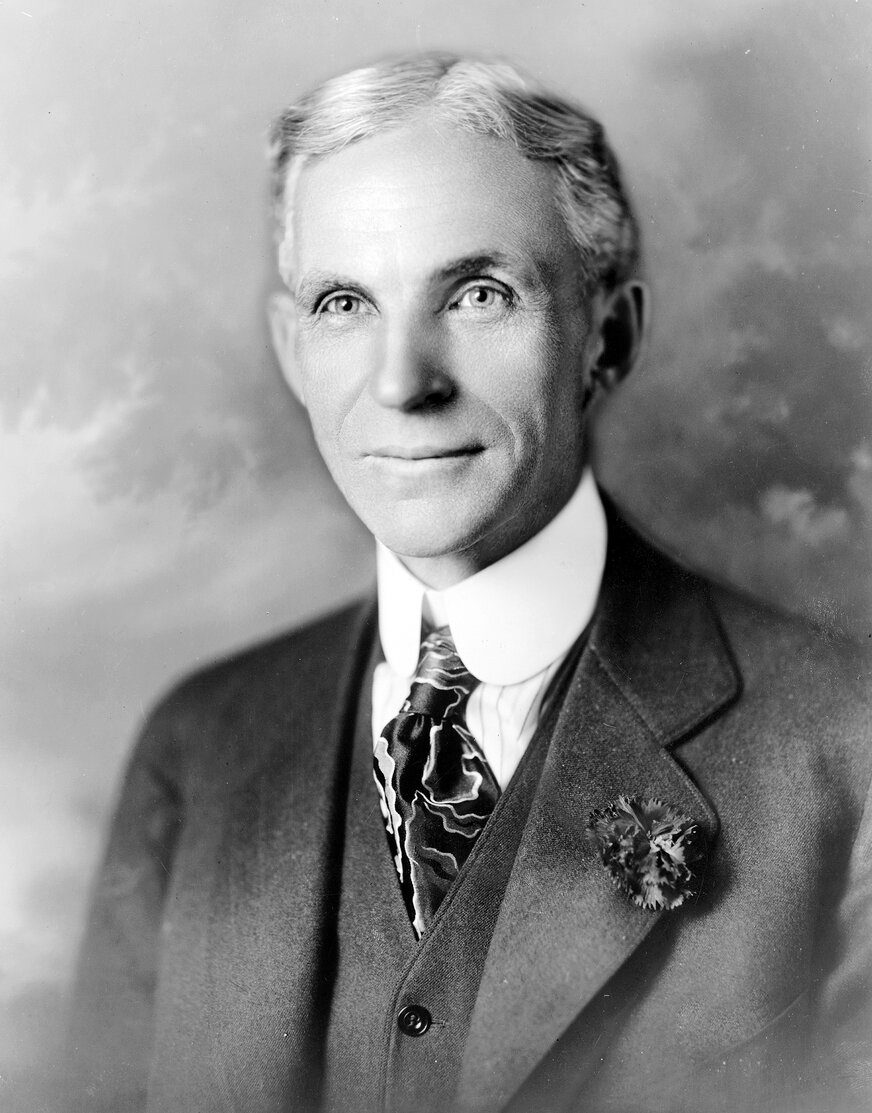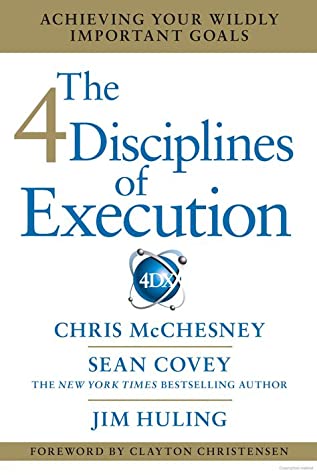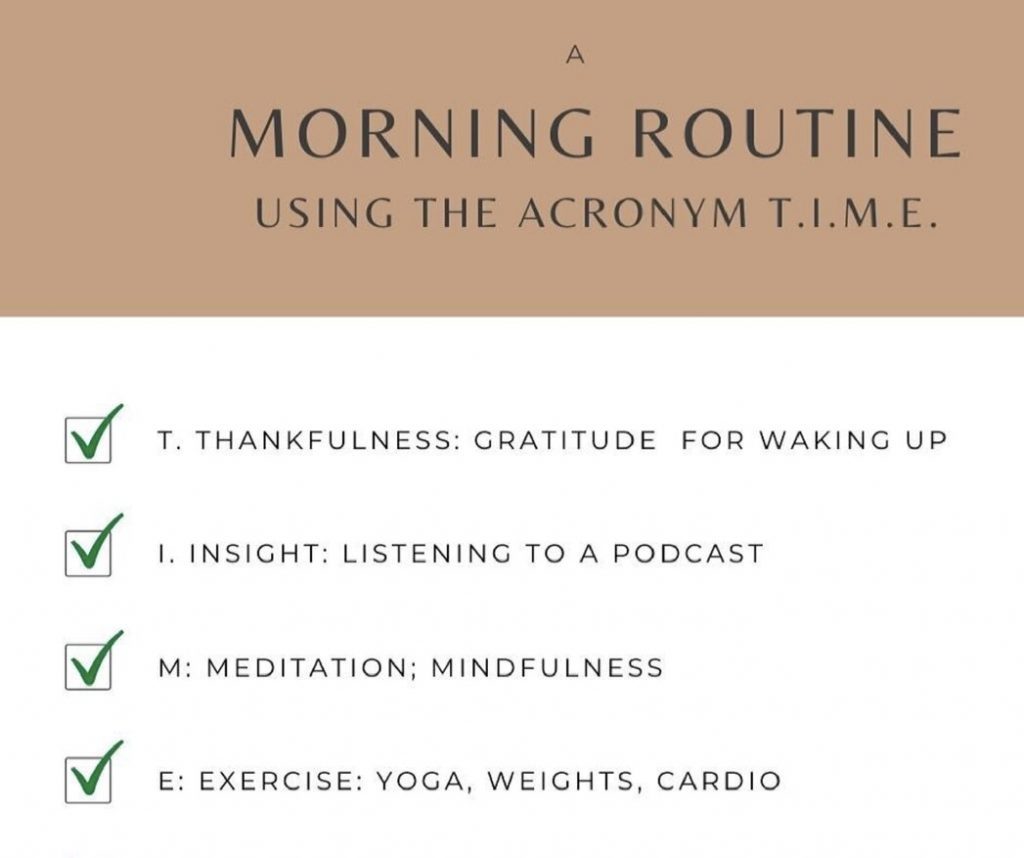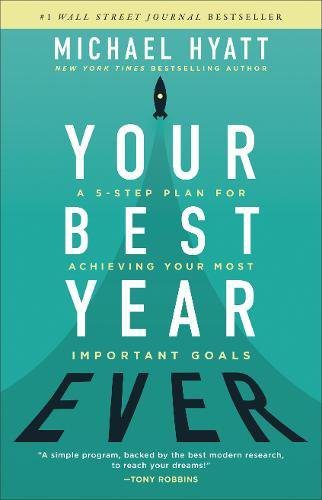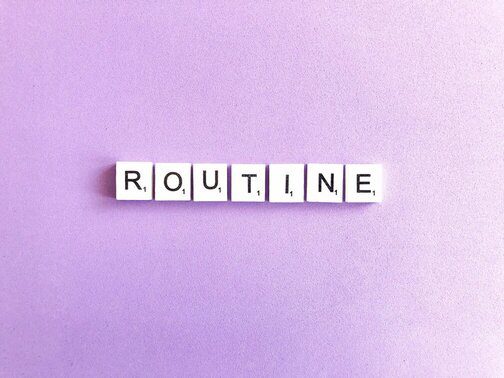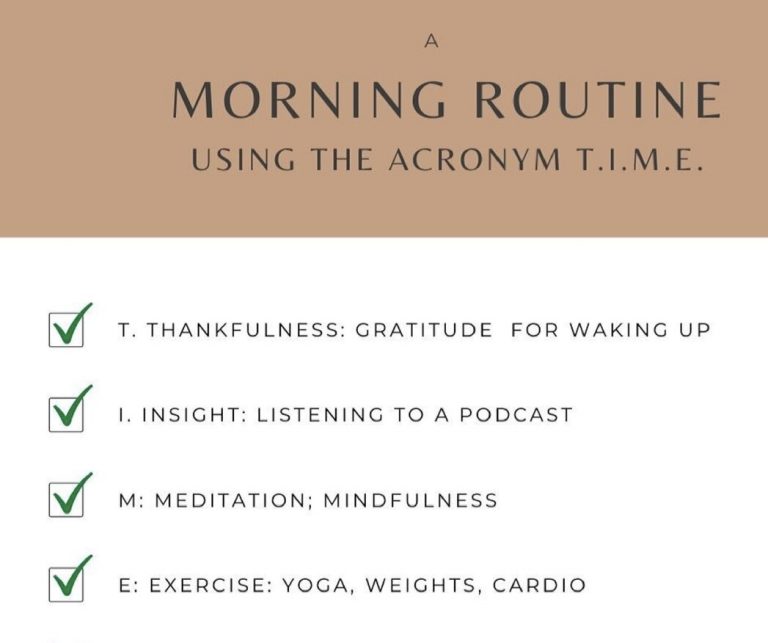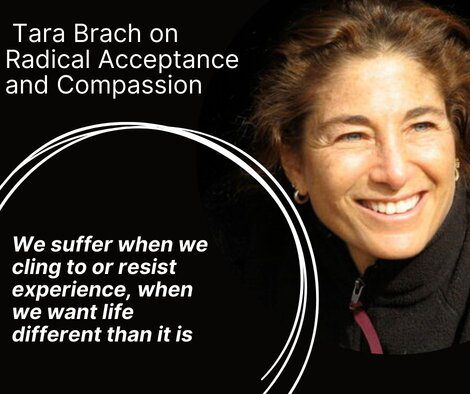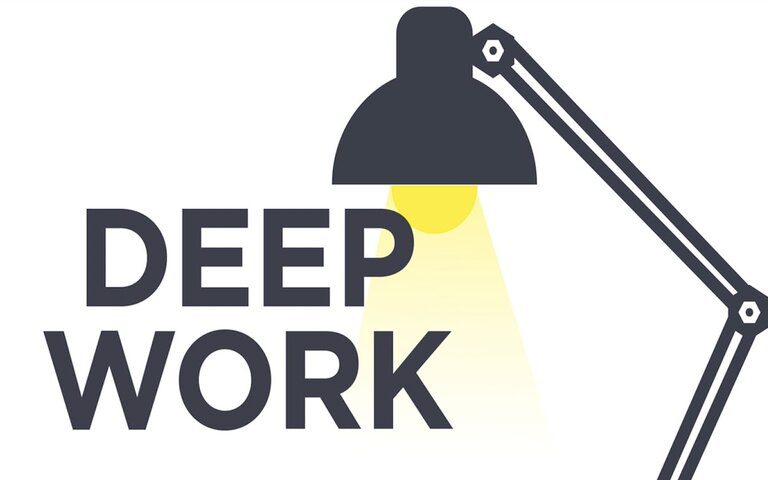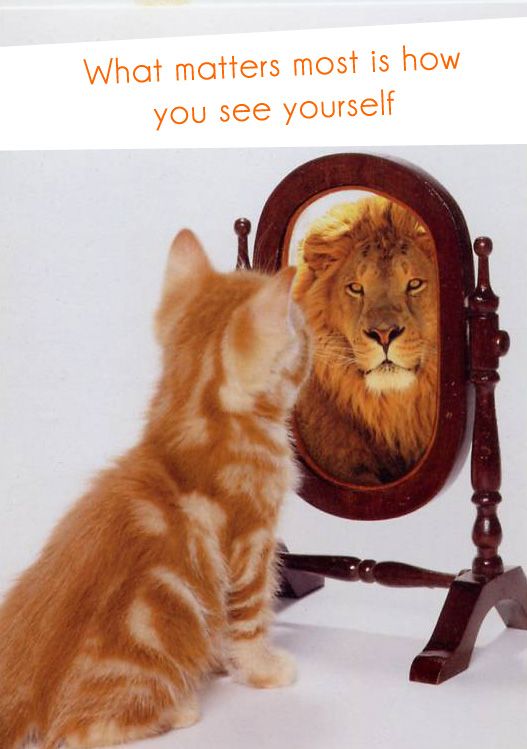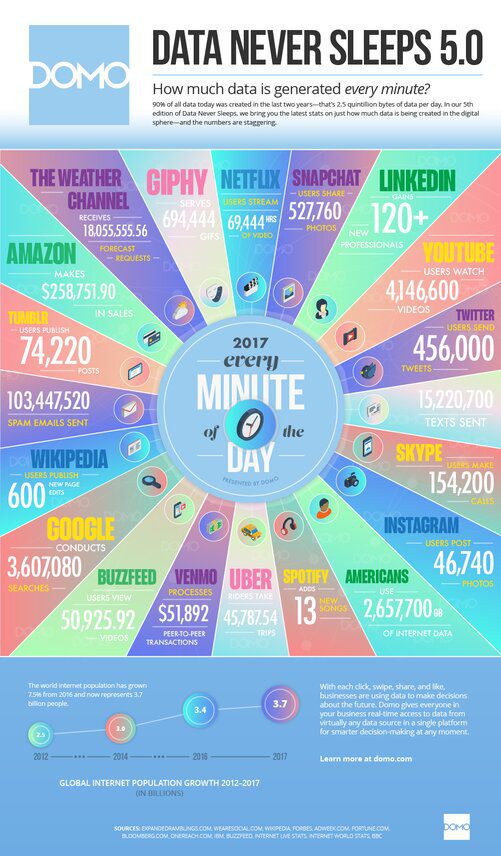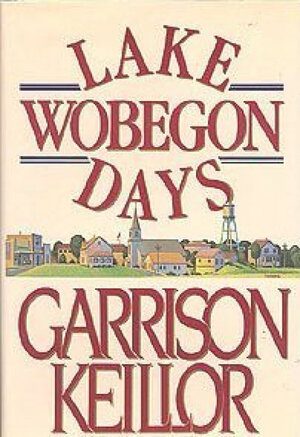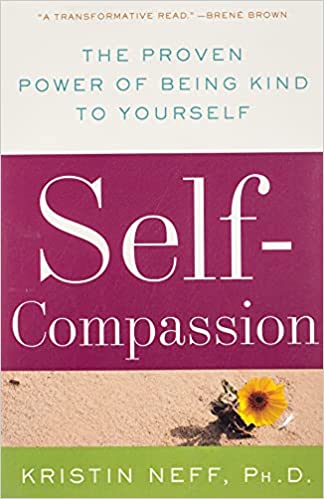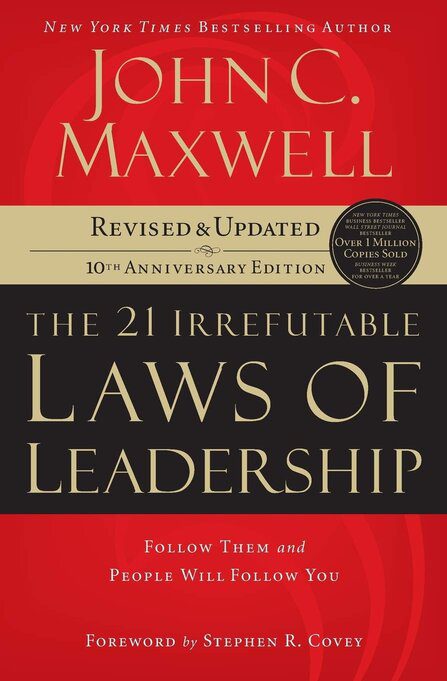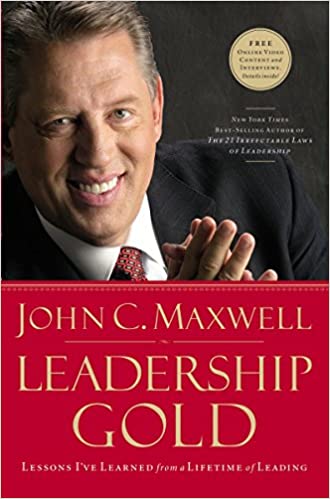Focusing too much on what others have to say about you will lead you down a path to defeat before you’ve even had a chance to act. You can either entertain their skepticism or remove the chains from your creativity by allowing yourself to rise to the occasion
In his very insightful book, 12 Notes: On Life and Creativity, 80-time Grammy nominee and 8-time Grammy award winner Quincy Jones share a great anecdote about being underestimated, believing in yourself, and ignoring the naysayers. Quincy Jones had earlier pitched Micheal Jackson on producing his solo albums but the record executives at epic records were not enthusiastic about Quincy producing the records.
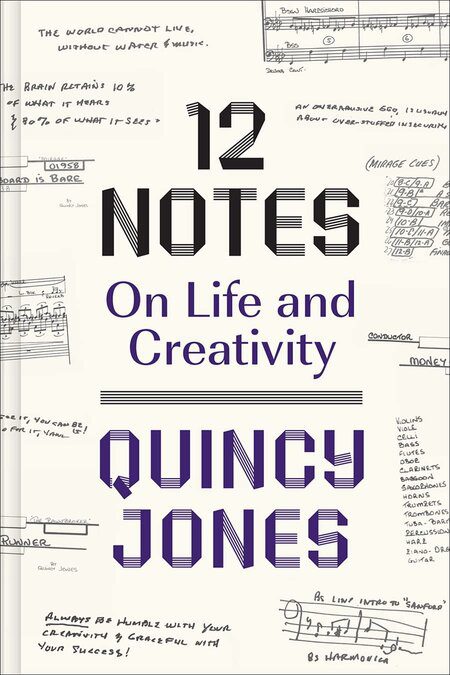
The executives said:
No way. Quincy’s too jazzy. He’s only done The Brothers Johnson. He’s a jazz arranger and composer.
But in spite of the doubters, naysayers, and the non-cooperation, the collaboration between Quincy Jones and Micheal Jackson led to the following:
- Off the Wall, sold tens of millions of copies. It became the biggest-selling Black record in history. It also became the first album to generate four American Top 10 hits.
- Thriller Album is the bestselling album of all time. Thriller became Jackson’s first number one album on the US Billboard Top LPs & Tapes chart, where it spent a record 37 non-consecutive weeks at number one, from February 26, 1983, to April 14, 1984.
- Bad Album – Bad debuted at number one on the Billboard Top Pop Albums chart, selling over 2.25 million copies in its first week in the US, and stayed atop for six consecutive weeks. It also reached number one in 24 other countries, including the UK, where it sold 500,000 copies in its first five days and became the country’s best-selling album of 1987.
Quincy writes:
There are numerous instances in which I’ve found power in being underestimated, but one of the most ironic memories is from when I began working with Michael Jackson as the producer of his top three albums, Off the Wall, Thriller, and Bad. Music history might look a bit different if I allowed negative opinions to stand in the way of what I knew I was capable of. But as I said, prematurely boasting only sets you up to look like a fool, so I’ll let you decide what you want to take from the following anecdote.
By the late ’60s, I was getting completely burned out from doing movie scores. I had done thirty-five of them and had both hits and flops. Most composers do one or two a year, but I never did fewer than that. I once did eight! I was moving at an unsustainable pace. I remember often sleeping only three hours a day and running cold water over my wrists to stay awake.
I also had three more kids after Jolie at this point, including Rachel, Tina, and Quincy Jones III, so there weren’t many hours to work with in the day. Simultaneously, film scorers (especially Black film scorers) were at the bottom of the Hollywood food chain, and easily replaceable. It felt as though my value in the industry was constantly hanging by a thread. At the drop of a dime, I could be cut loose. Most important, I wanted to get away from the rigidity of having to write music to pictures.
I longed to get back into the record business and wanted to make albums under my own name, produce for other artists, and facilitate a more free-flowing creative process. I didn’t want to think about any deadlines. I simply wanted to create what gave me goosebumps. In 1969, I signed a deal with Creed Taylor’s Impulse! Records, which was distributed by A&M, and did a good number of albums through the ’70s, including Walking in Space, one of the first jazz-fusion records, Gula Matari, Body Heat, a whole host of projects with The Brothers Johnson, and many more. Toward the end of the ’70s, I was recruited back to film after Sidney Lumet asked me to be the music producer and supervisor for his new movie, The Wiz. I didn’t want to do it, but since Sidney helped me get my first scoring assignment, on The Pawnbroker back in 1964, I couldn’t say no.
Micheal Jackson
I had previously met Michael Jackson when he was only twelve years old, but The Wiz brought us together for our first official collaboration, since he was cast in the role of Scarecrow. When we began rehearsals, Michael was getting ready to do his own album on Epic Records and he asked me to help him find a producer. My plate was pretty full trying to get pre-production for The Wiz going, so I couldn’t even think about it at the time. But over the course of our rehearsals, I came to see that, on top of his otherworldly talents, Michael had a work ethic like I’d never seen before. No matter what, he was always prepared. He ensured that every dance step, line, and lyric was perfected to a T, and even memorized the lines of his co-stars.
In one scene, he was instructed to pull little pieces of paper out of his straw chest. They were filled with proverbs from famous philosophers and he kept mispronouncing Socrates. After three days of mispronouncing his name as “Sow-cray-tees,” and receiving no correction, I pulled him aside during a break and whispered, “Michael, before it becomes a habit, I think you should know that the name is pronounced ‘Sock-ra-tees.’” With the utmost humility, he said, “Really?”
Without even taking a second to think about it, I replied with, “I’d like to take a shot at producing your new record.” His ability to take critique, on top of his work ethic and talent, indicated that he was exactly the kind of artist I would want to work with. He agreed.
No way. Quincy’s too jazzy. He’s only done The Brothers Johnson. He’s a jazz arranger and composer.
Later, when Michael approached his label, Epic Records, about having me produce the album, his A&R reps told him, “No way. Quincy’s too jazzy. He’s only done The Brothers Johnson. He’s a jazz arranger and composer.” It was the same type of response that I’d heard repeatedly over the years. They didn’t know about the extent of my musical background, and they told Michael that Kenny Gamble and Leon Huff should do it. He eventually marched back to Epic with his managers, Freddy DeMann and Ron Weisner, and demanded that I produce his record.
Prove them Wrong
Much to his label’s dismay, they agreed, but didn’t expect much from me. And although they agreed, there wasn’t a whole lot of cooperation. At that point it didn’t matter though, because the ball was left in my court. I knew that I could either meet their low expectations or exceed them. In addition to their doubts about the level of my competency, many also wondered if Michael could make it as a solo artist in his adult years without the support of his brothers.
I knew that I could either meet their low expectations or exceed them. In addition to their doubts about the level of my competency, many also wondered if Michael could make it as a solo artist in his adult years without the support of his brothers.
I had of course known about his Jackson 5 days, but I was interested in helping him break out of that former persona he was locked into. I wanted to push him beyond just dance music and see how far he could stretch his musicality. I had recently seen him at the Oscars singing “Ben,” a song about a rat (for the film, Ben), which I knew wasn’t going to cut it.
More than anything, I wanted to help him with his artistic development and get him to dig deeper, with no limitations on how far he could go musically. He had all the talent and drive. He did his homework. He just needed some guidance. I tested his creativity from every angle and applied everything I’d learned over the years to help him with his artistic growth, like dropping keys a minor third to give him flexibility and a more mature range in his upper and lower registers. I played around with tempo changes. I wanted to make a pop album that blended elements of R&B, disco rhythms, top-of-the-line arrangements, and, of course, his vocals.
The Dream Team
I gathered what I called my “Killer Q Posse,” which consisted of Rod Temperton, one of the best songwriters to have ever lived on this planet; Bruce Swedien, the engineer of all engineers; Greg Phillinganes, a virtuosic keyboardist; Jerry Hey, a monster trumpeter and arranger; Louis Johnson, the youngest of The Brothers Johnson; John “J. R.” Robinson, a fellow Berklee alum and the drummer for Rufus; Paulinho Da Costa from Brazil on percussion; and many other great musical talents. Although it was impossible to predict the record’s chances of success, we collectively poured 110 percent into every track and nuance of the album.
In an attempt to steer Michael toward songs with more depth and emotion than he had ever sung before, I got Stevie Wonder’s “I Can’t Help It,” Paul McCartney’s “Girlfriend,” Tom Bahler’s “She’s Out of My Life” (a track that I was initially going to give to Frank Sinatra!), Rod Temperton’s “Rock With You,” and, of course, “Don’t Stop ’Til You Get Enough.”
Off the Wall Album
Michael did most of his vocals live, with no overdubs. The resulting record, Off the Wall, sold tens of millions of copies. It became the biggest-selling Black record in history. How’s that for being too “jazzy”? Ironically, Epic was about to do a round of layoffs, but Off the Wall saved the jobs of many of the doubters who previously claimed that “Quincy is the wrong guy.” It also became the first album to generate four American Top 10 hits.
Due to the success of Off the Wall, Michael and I went on to record Thriller (which is, as of this writing, still the bestselling album of all time) and Bad.
Lesson Learned from the Experience
The entire experience reinforced the fact that people are always going to have opinions about your qualifications. What really matters is what you do with them. Focusing too much on what others have to say about you will lead you down a path to defeat before you’ve even had a chance to act. You can either entertain their skepticism or remove the chains from your creativity by allowing yourself to rise to the occasion.
I still have to remind myself of this lesson because my being underestimated didn’t stop after Off the Wall, or Thriller, or Bad. In fact, the more ears that heard those albums, the more opinions I had coming at me.
But now, instead of being underestimated for my capabilities, I’m underestimated for my age. People often ask me when I’m going to retire, but my only response is, “I’m just starting. Retired? You take the ‘re’ off of that and it’s ‘tired.’ I’m not tired yet.” If you never leave, you never have to make a comeback, and that’s exactly what I plan on doing. There’s nothing wrong with retiring, especially after you’ve put in decades of hard work, but it’s just not for me. I’m not interested in letting my age dictate my competency.
All the Best in your quest to get Better. Don’t Settle: Live with Passion.
